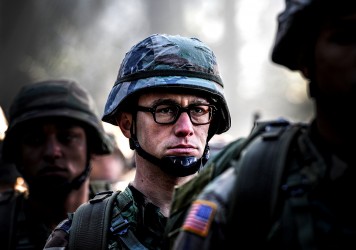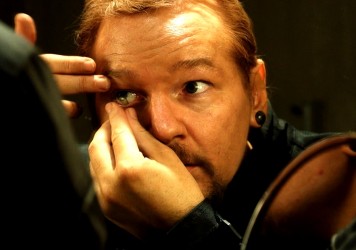Laura Poitras’ real-life spy thriller shows how and why Edward Snowden stepped up to blow the whistle on government spying.
You could imagine Laura Poitras’ extraordinary CITIZENFOUR making a great and very claustrophobic one-act play. Despite its central, pot-boiler drama taking place almost entirely in a cramped Hong Kong hotel suite, you’re constantly made to feel the presence of insidious and unseen outside forces who are, to paraphrase the film’s “hero”, Edward Snowden, constantly on the verge of kicking down the door.
At one point, while Snowden is priming Guardian journalist Glenn Greenwald’s laptop for clandestine comms, an unannounced fire alarm test occurs in the hallway — a moment of high tension that is immediately read as the game being rumbled before it has started. And in the spirit of its subject, CITIZENFOUR (Snowden’s codename) feels every bit a film that’s been made via cloak and dagger methods and then smuggled behind enemy lines to our cinema screens.
It’s a simple filmed chronicle of how Poitras and the politically-minded Greenwald came into contact with a covert whistleblower who offered them (via a series of encrypted emails) the chance to land the scoop of the century. Those who have followed the drip-feed of revelations to come from Snowden’s need-to-know payload will be aware of the basic structure of the story and will possibly even have decided whose side they’re on. Yet in focusing entirely on the process of whistleblowing – the banality of the act – Poitras has produced a work that is at once politically empowering and an encapsulation history unfolding on camera.
The central revelation here is that we’re given the first detailed character profile of Snowden as a person, at one time a punch-clock corporate stooge who was seconded by the NSA and handed the highest security clearance possible to be able to develop sophisticated new spy software, and now a bespectacled emblem of liberty who appears to be very comfortable with sacrificing his own life and privacy so the public might be able to retain some paltry semblance of theirs. It’s foremost an extremely sad story, less due to what governments have been furtively sanctioning in the name of national security, and more that their machinations have reached a danger point where someone felt the need to step up onto a fiery podium and say enough is enough.
This is a film which upturns Le Carré-style classical conceptions of fuddy-duddy political activism and affirms that the new face of the enlightened left is under 30, prodigiously clever, hyper articulate and is in possession of an acute understanding of The Enemy and their tactics. Yet, with much modern technology produced with bugs and microphones ready-implemented into the design (part of an unfathomable and far-reaching corporate conspiracy, we’re told), shady meetings in underground carparks to trade briefcases remains the safest form of communication. In essence, CITZENFOUR also acts as a guide for existing in a world where human beings are guilty until proven innocent and are essentially walking sources of metadata that can be handed, part and parcel, to corporate interests. The brilliant coda presents the joys of pre-digital communication while also offering a mocking satirical dialogue with anyone who might happen to be listening in.
By design, the film doesn’t quite have the stamina for a long race, and after Snowden has been spirited away from Hong Kong and forced to spend 40 nights in the diplomatic purgatory of the arrivals lounge of Moscow Airport, we lose that sense of on-the-lam immediacy. There are still twists and turns, but personal safety means that they can’t be depicted on camera, and so there are some more general discussions about the ramifications of what the government are doing.
Despite all that, perhaps the film’s greatest coup is in framing Barack Obama as a leader with even greater moral turpitude than George Bush Jr, a staggering and depressing feat in itself. Plus, the film’s very existence stands as testament to the fact that while we maybe cowering under the corporate jackboot, we still have the power of expression, and that’s all we need to get the resistance moving. They may have the semantic doublespeak down pat, but we have the power, knowledge and tenacity to beat them at their own game.
Published 30 Oct 2014
New film from director and NSA target Laura Poitras.
A simple guide showing how to take down the US government in eight days.
There’s 20 minutes of stalling in the second half, but the finale is a killer.

By Fred Wagner
Oliver Stone’s Snowden will look to realistically show the actions of the NSA and other government agencies.

By Ed Frankl
Laura Poitras follows up CITIZENFOUR with an equally extraordinary portrait of Julian Assange and WikiLeaks.

Some of the world’s leading documentarians take the pulse of an ever-changing artistic medium.